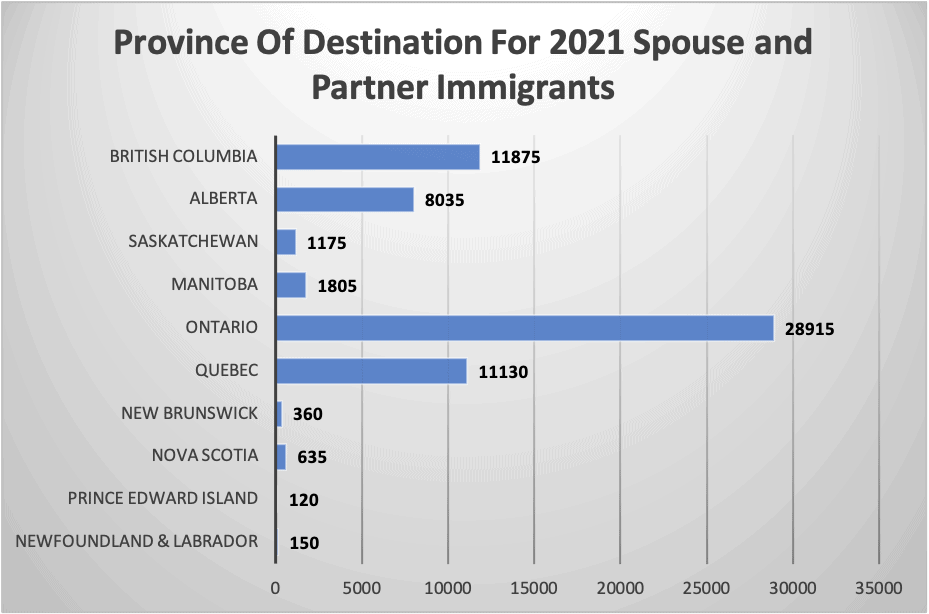More than 80 percent of the 64,200 spouse and partner immigrants to Canada in 2021 came to three provinces: Ontario, British Columbia and Quebec.
Open Government figures show Ontario dominated as the preferred province of destination, welcoming nearly 29,000 spouse and partner immigrants, or 45 percent of the total.
British Columbia was a distant second with nearly 12,000 newcomers in the category, or 18.5 percent, while Quebec saw just over 11,000 arrive, or 17.3 percent.

Read More
How Many Spouses, Partners and Children Will Immigrate To Canada In 2022?
Family Sponsorship Immigration For Spouse, Common-Law or Conjugal Partner
Spouses Must Now Show French-Language Proficiency for Quebec Experience Program (PEQ)
Canada’s latest Immigration Levels Plan targets 80,000 through permanent residence streams for spouses, partners and children in 2022.
That number represents the majority of the 105,000 Family Class immigrants set to be welcomed this year, with the remainder coming through the Parents and Grandparents Program.
It shows that there are plenty of options for Canadian citizens and permanent residents looking to bring their families to Canada.
Immigration Levels Plans For Spouses, Partners and Children
|
2022 |
2023 |
2024 |
|
|
Spouses, Partners and Children |
80,000 |
81,000 |
81,000 |
Spousal reunification was one of the many immigration streams that saw a significant rise in processing times due to the COVID-19 pandemic.
However, Immigration Minister Sean Fraser said in January that the stream was one of the first to return to the 12-month service standard for processing.
Other categories, including those for Federal High Skilled workers, still have processing times far in excess of that service standard.
Family Sponsorship Applicants Can Check Application Status
Meanwhile, Canada recently launched a new application tracker for family sponsorship candidates to check the status of their immigration file
For the initial launch, which happened in February, the tracker is available for permanent residence applicants in the spouse, partner and dependent child categories.
Watch Video
Applicants for permanent residence in the family sponsorship categories are now able to use this tracker to check the status of their applications.
“This new tool will allow people to easily check their application status online, and is available for spousal, partners or dependent children categories,” tweeted Fraser at the time. “We’re also working to provide a similar tracker for other programs.”
Who Is Eligible To Sponsor Their Spouse, Common-Law or Conjugal Partner?
Sponsors must:
- Be at least 18 years old.
- Be a Canadian citizen, permanent resident, or a person registered in Canada as an Indian under the Canadian Indian Act.
- Canadian citizens living outside Canada must show they plan to live in Canada when the sponsored person(s) become permanent residents.
- Permanent residents living outside Canada cannot be sponsors.
- Be able to prove they are not receiving social assistance for reasons other than a disability.
- Be able to provide for the basic needs of those being sponsored.
Who Can Be Sponsored?
The person being sponsored and their family members must pass background, security and medical checks.
Spouse
A spouse can be either sex and must be:
- Legally married to the sponsor.
- At least 18 years old.
Common-Law Partner
A common-law partner can be either sex and must:
- Be not legally married to the sponsor.
- Be at least 18 years old.
- Have been living with the sponsor for at least 12 consecutive months in a conjugal relationship without any long periods apart.
Proof of a common-law relationship includes:
- Shared ownership of residential property.
- Joint leases or rental agreements.
- Bills for shared utility accounts.
- Important documents showing the same address, such as driver’s licenses or insurance policies.
- Identification documents.
Conjugal Partner
A conjugal partner can be either sex and must:
- Be not legally married or in a common-law relationship with the sponsor.
- Be at least 18 years old.
- Have been in a relationship with the sponsor for at least 1 year.
- Live outside Canada.
- Be not able to live with the sponsor in their country of residence or marry the sponsor because of significant legal and immigration reasons, such as marital status, sexual orientation or persecution.